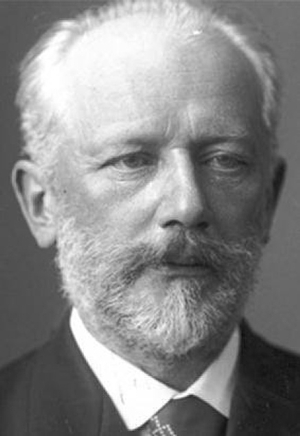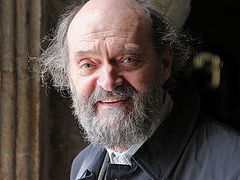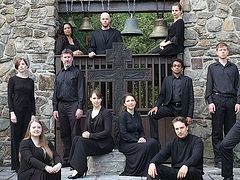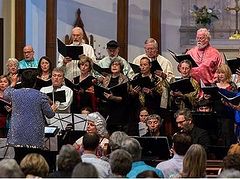Source: Frontline
October 28, 2015
 Pyotr Ilyich Tchaikovsky
Pyotr Ilyich Tchaikovsky This tension between east and west was inevitably accompanied by intermingling between these various originating strands: of local folk idioms and the more classical, strictly European tradition. This interaction generated what many have seen as the unique characteristics of Russian music, both Slavonic and Judaeo-Christian in terms of sources, at once intensely nationalist in inspiration and supremely internationalist in gaze, and eventually universal in appeal. As in much of Europe, the early classical traditions began with music in the cause of religion, in this case the Russian Orthodox Church, where chant and choral singing developed. Indeed, secular music was actually proscribed by the Church until the 15th century, and while this scarcely prevented a robust folk music from developing with its own instruments and vocal traditions of epic “song cycles”, it did inhibit the emergence of more classical forms of music in secular life.
In the courtly life of late medieval Tsarist Russia, the lack of a developed indigenous musical tradition was sought to be compensated for from the reign of Ivan IV onwards through the import of musicians and composers from abroad, essentially from the rest of Europe. Peter the Great actively discouraged local musical talent through his conviction that true music and its exponents were to be found in western Europe, particularly France, Austria, Germany and Italy. Up to the reign of Catherine the Great, both composers and performers at the Tsarist court came mainly from these countries.
But from then on, the reaction set in, with the perception that such music did not reflect Russian sensibilities and that more needed to be done to develop an indigenous musical tradition. The time of Catherine the Great marked a turning point, with an active effort by the Tsarist court to encourage the flowering of a distinctly nationalist approach to music making. The folk music traditions that had been treated with condescension as rather vulgar by an elite that was sycophantic to all things Western were discovered to hold great musical potential, providing a rich vein to be tapped for nationalist purposes. By the early 19th century, this found expression in the compositions of Mikhail Glinka, who declared: “I want to unite the songs of the Russian people with the good old occidental fugue, in legal marriage.”
By the late 19th century, the fervour for musical nationalism had become even stronger, reaching its peak with the work of a fascinating group of self-taught composers who called themselves the “Mighty Five”. Balakirev, Cesar Cui, Borodin, Mussorgsky and Rimsky-Korsakov based their compositions on Russian history, folk tales and literature and drew freely from peasant songs and other folk sources for their musical ideas. The fact that they were largely self-taught amateur musicians who were professionals in other areas (drawn from the ranks of engineers, chemists and military officers) gave their music a freedom unconstrained by the “technical” requirements of composition like sonata form or even harmony, adding to the sense of a peculiarly local or national evolution of the music.
This was counterposed by the parallel emergence of a more trained, formal and mainstream “classical school”, exemplified by the brothers Anton and Nikolai Rubenstein, who set up proper conservatoires of music, and followed by Pyotr Ilyich Tchaikovsky. The resulting emergence of “nationalist” and “classical”, or European, schools of music and the rivalry between the two became an almost constant feature of Russian music until the mid 20th century. It was later reflected in rivalry between the Moscow Conservatory (representing the more conservative or Western school) and the St Petersburg one (dominated by romantic nationalism).
Yet these differences grew increasingly hazy, especially as composers such as Tchaikovsky and later Sergei Rachmaninov used the Western classical grammar and idiom but also drew heavily from folk music. Tchaikovsky has sometimes been seen as the most Russian of all the Russian composers despite his Western-style musical training. The “Five” invented themes with an inherently Russian character, often sui generis and with their own very particular instrumentation and tonal colours. Tchaikovsky, by contrast, took local folk melodies and transformed them into material for symphonies, concerti and ballet that became very much part of the “Western” canon. It is true that some of his more popular and well-loved works, such as the Piano Concerto, the Violin Concerto, the Pathetique Symphony and his ballet music, are firmly within the mainstream Romantic tradition that was simultaneously being expressed in other parts of Europe. Even so the “extreme sentimentality” that characterises much of Tchaikovsky’s music has its roots in the deeply felt emotionalism that characterised the Russian approach to art in general.
This is also true of Rachmaninov, even though he left Soviet Russia in 1918, never to return. In effect, you can take the man out of Russia but you cannot take Russia out of the man. The Piano Concertos, for example, display the raw power and intense emotion that seem to exemplify at least the stereotypical notion of the Russian psyche. In the case of Sergei Prokofiev, the pull of Russia was even stronger, as he returned to the Soviet Union in 1932 after several years abroad and eventually died there two decades later. Paradoxically, Prokofiev’s music is much less inherently “Russian” than that of the emigre Rachmaninov, whose music remained deeply Slavic in sensibility. Prokofiev was a classicist par excellence, the creator of numerous works that were uniquely his but could really have been written anywhere in Europe, often reflecting in particular the nuance and subtlety evident in French expressionist music.
The career of Dmitri Shostakovich, the other major Russian composer of the 20th century, has often been held up to describe the travails of an artist trying to function in a state-dominated artistic system in which the contours of composition are determined by what is deemed politically correct. He was very much a product of the Russian system. He entered the St Petersburg Conservatoire at the age of 13 and won the prestigious Chopin competition at the age of 21. He was a much lauded Soviet composer, but his career was chequered with periodic official criticism and sometimes even condemnation of his occasional forays into what was termed as unacceptably “avant garde” elements. While he produced major works that became iconic music of the Soviet Union (such as the famous symphony commemorating the siege of Leningrad), some of his other music was even banned for some periods. Yet he was throughout his life much more than a loyal citizen of the Soviet Union; he remained committed to the ideals of socialism and saw his music as another means of expressing this.
So what then is the combined impact of this complex musical legacy on “art music” in the rest of the world? The creative potential of the tension between local and external influences is certainly one feature that has many other reflections elsewhere. A similar creative tension was evident in terms of the relationship between the artist and the state, which too has resonance in many other parts of the world and other times. Yet the most enduring legacy is one that may be harder to capture in banal non-musical phraseology.
It is of a certain conception of both composition and performance, which was latterly exemplified by the brilliance and profundity of the Russian school of piano playing that emerged from the great conservatoires. While the musical training of these schools is known to be technically extremely demanding, that is not where the focus of the pedagogy lies. Rather, it is shaped by the belief that understanding and imagination are the true keys to musical interpretation: to achieve some in performance, it must first be recognised, planned and shaped by artistic fantasy. The trust in and even emphasis on the human spirit that can control the flesh is perhaps the finest impact of the Russian tradition on not just classical music but all artistic endeavour.



